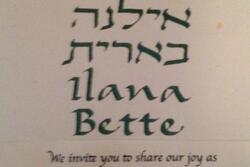Finding Sisterhood at Services
I knew I was getting older when my mom stopped letting me bring Archie comics and Crayola crayons with me to services. These kept me entertained, even if it meant hiding my comics behind the prayer books, peeking over them periodically to see if anyone had noticed the offending material.
I would be lying if I said that I hung on to every word that my rabbi said during services each week as a child. It wasn’t that I hated services, it was just that racing my brothers down abandoned hallways and sliding down banisters during services was so much more fun. Leaving services to “go get a drink of water” was something I did quite frequently, timing my hasty exits perfectly with those of my friends across the room with a wink and a sly gesture. Then we would run and jump, ducking behind walls to avoid the congregants who frowned at us. There is something magical about the physical serenity of a temple when the community is in prayer—I’d often pause, mid-cartwheel, to observe the congregation rise and sit in perfect unison from a giant window overlooking the scene.
After my mom made it clear that I couldn’t get away with leaving services to frolic with my friends or leave scribbled Crayola creations on the handed out programs, I resorted to different, less conspicuous games: counting all of the bald heads I could find hidden under different shades of kippot, or making up scenarios in which the rabbi would burst into a musical number complete with a tap dance. After some personal exploration, and some stern looks from the lady in the row in front of me, I stumbled upon a game that I liked even better—immersing myself in the stories of the Tanakh, the Jewish collection of scriptures. More particularly, the powerful women whose words and dreams were woven throughout the stories of the Tanakh. While the congregation around me paid rapt attention to the rabbi’s, or the melodious prayers, I became wrapped up in my own type of prayer, whether I knew it or not at the time.
The stories that attracted me most in this thick, leather-bound red book were almost always one about a beautiful, powerful woman. I held my breath with Esther, a young woman who becomes Queen of Persia, and struggled with her as she hid her identity as a Jew. I fought alongside the Prophetess Deborah, a fierce warrior who led thousands of soldiers in battle against the oppressive Canaanite troops. I cried with Leah and Rachel, whose strength in sisterhood was broken as they both became involved with Jacob. I became so lost in the world of the women in the Tanakh that I often missed the rabbi’s cues to rise and sit, and needed a prodding from my dad (or a kick under the chair from my younger brother). This realization did wonders for my connections with Judaism. No longer did I roll my eyes when it was time to go to services, because for me, it was story time. Services became so much more bearable now that I could search through the books looking for the “women warriors in the Tanakh,” as I called them. Now, I am so intrigued within Judaism when it comes to seeing women play prominent roles in these wildly important and beautiful stories.
One of the reasons I identify so strongly as a feminist is my relationship with the women in the Tanakh—those who fought with grace and dignity to lead the Jewish people alongside better-known male leaders. Each story taught me a different lesson, and these lessons came to me at an important time in my life. The lack of Archie comics and crayons were a larger metaphor for me having to grow up—something I was very reluctant to do. With the stories I read I was ushered into a kind of sisterhood, one that was created by the women of the Torah, and one that stretched and surrounded every Jewish woman and girl. This sisterhood is what brings my feminism and Judaism together, two of the most important parts of my identity, and offers me a way to bring a voice to the silenced women of the Torah.
This piece was written as part of JWA’s Rising Voices Fellowship.







